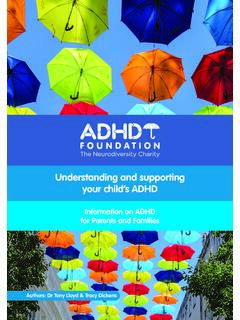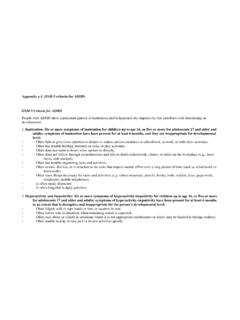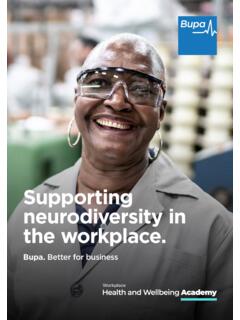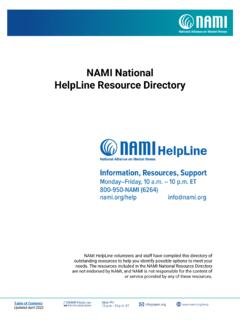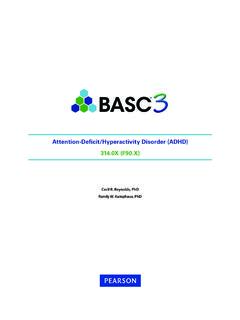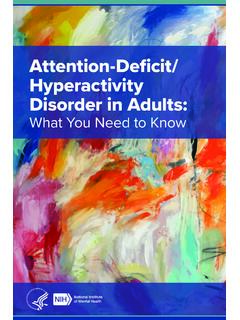Transcription of An employer’s guide to ADHD in the workplace
1 1 An employer s guide to adhd in the workplace If you are reading this, it may be because you are employing, or considering employing, someone who has told you that they have attention deficit hyperactivity Disorder ( adhd ). Or perhaps they have symptoms and adhd has been raised as a possible cause for them. This guide aims to answer the many questions that you may have about adhd : What is adhd ? How will it affect my employee and on the rest of the team and organisation? What can I do to support them? Not everyone with adhd will need extra support in the workplace , and those who do may need only small changes known under the Equality Act 2010 as reasonable adjustments to help them to work effectively. Most of these will cost little or nothing to implement.
2 People with adhd often talk about lack of support from their employer as a reason why they may end up leaving a job. However, with support, understanding and some small changes to capitalise on their strengths and talents and get around difficulties, they are likely to be a great asset to your organisation. Many people with adhd are noted for strengths such as: Ability to hyperfocus on things they are interested in Willingness to take risks Spontaneous and flexible Good in a crisis Creative ideas thinking outside the box Relentless energy Often optimistic Being motivated by short term deadlines working in sprints rather than marathons Often an eye for detail Remember: Everyone with adhd is different, and the condition affects different people in different ways.
3 People with adhd have the same broad range of skills, interests and intelligence as the rest of society. It s important to communicate openly with your employee so that you can find out what support would help them most and ask them any questions you may have. 2 What is adhd ? adhd is a neurodevelopmental condition affecting brain structure and neurotransmission: the way in which messages are communicated around the brain and different areas of the brain are activated. adhd is thought to be caused by a complex mix of environmental and genetic factors, but is a strongly hereditary condition. adhd is present from childhood, but an increasing number of adults are now being diagnosed with adhd for the first time, having been missed when they were younger and the condition was not as well understood as it is now.
4 adhd has three core symptoms which affect people with it to different degrees: Inattention Difficulties with concentration, short term and working memory Difficulties with planning and getting started (activation) Difficulty with organisation and losing things Easily distracted by small things which others wouldn't notice Impulsiveness Acting or speaking on the spur of the moment without thinking through the consequences. Difficulty controlling emotions hyperactivity Whilst adults with adhd are usually much less active than children with adhd , they may still have symptoms such as restlessness and the need to tap or fidget. Some people are diagnosed with attention deficit disorder, without hyperactivity : this is particularly the case for girls and women.
5 Whilst not a core symptom, many people with adhd have problems with sleep. This can have knock-on consequences for getting up and out to work in the morning. It is thought that around 4% of the adult population would benefit from treatment for ADHD1, but in 2017 fewer than 1 in 1000 adults in Scotland were taking medication for ADHD2. adhd can be diagnosed on its own, but often comes alongside a number of other associated conditions. These include sensory difficulties (being over- or under- sensitive to sights, sounds and other sensations), dyslexia, dyspraxia (coordination difficulties), tics, and autistic spectrum disorder. Some (but by no means all) people with adhd also develop mental health difficulties such as anxiety and depression.
6 3 How is adhd treated? adhd is a lifelong condition and cannot be cured but it can be successfully managed. Many people with adhd find their symptoms improve with medication but this only works for as long as the medication is in the body. The main side effects of the most commonly used medications (stimulants) are appetite loss and difficulties with sleep. adhd medication must be started and kept under review by a consultant psychiatrist. People with adhd may also benefit from counselling and cognitive behavioural therapy, as well as education about the condition and coaching to help them manage day to day activities. Unfortunately these treatments are not as widely available in the UK as they should be3. What types of jobs suit people with adhd ?
7 Bearing in mind that everyone with adhd is unique, there are as many jobs for people with adhd as there are people with adhd ! However, in general, jobs which play to the strengths of people with adhd provide: Jobs which provide NOT jobs which feature Good fit with individual s interests and skills boredom and low interest will make focus much more difficult Structured work day Opportunities for movement Stimulation reaction to incoming demands Regular and fairly immediate feedback Long periods working in isolation Monotonous and repetitive tasks without variation Need for high levels of concentration to manage risk ( industrial safety monitoring, long distance driving)1 How can people with adhd be supported at work?
8 adhd , if its impact on the individual is significant, can be seen as a disability under the 2010 Equality Act and therefore employers have a responsibility to protect employees and potential employees from discrimination and harassment, and to make reasonable adjustments to assist them to do their jobs. But beyond the legal 1 By law, people with adhd must tell the DVLA if their adhd affects their ability to drive safely and ask their specialist if they are not sure. The DVLA may request additional information from a specialist and / or require them to take a driving assessment before making a decision on whether their license is affected. 4 obligation to offer support, doing this will help the person with adhd to perform to their very best and this is good all round.
9 The number one way in which employers can support employees with adhd is to find out about the condition and show understanding and a reasonable degree of flexibility in relation to the difficulties which it can cause. Examples of this might include: Agreeing a 15 minute start and finish time window, rather than a rigid fixed start time with sanctions for being slightly late Allowing the employee to delegate non-core aspects of the job which they find particularly difficult to complete, such as completing paperwork / timesheets which otherwise might make the whole job unachievable. Reasonable adjustments which employers might make to help people with adhd include: Modifications to the work environment Visual prompts wall charts for routines, checklists, post-it notes for reminders Physical reminders laying out everything needed for tomorrow at the end of today, labeled homes for storing tools Larger computer screens so everything is visible (reduces burden on memory) Visible clocks, allowing / encouraging use of alarms and timers Reducing distractions.
10 Allow headphones with music or ambient noise, or ear plugs Own space if possible, with reduced level of distraction Modifications to working and management practices Offer increased supervision / frequent check-ins and feedback ( daily or weekly planning and progress meetings with line manager) Tasks broken down into clear, bite size steps Give instructions and meeting notes in writing rather than verbally Operate a buddy system for tasks to help maintain focus Allow regular movement / stretching breaks: Pomodoro working (25 mins work + 5 mins break, with longer break after 4 Pomodoros) Scheduled breaks during long meetings / activities 5 Allowing useful technology There are a number of apps which can assist people with adhd and related difficulties.
